Data makes the world go round, and knowledge is indeed power, now more than ever. It’s safe to say that 2020 has become the year of data-driven marketing with 83% of B2B marketers focusing more on data analytics this year. Over two thirds (69%) even said they were making measurement and analytics their top priority.
The problem? An overwhelming 92% are only using data analysis tools provided with their current marketing stack, and nearly half aren’t even using advanced functionalities.

So before diving into which data analysis tools are best, it’s worth it to have a brief refresher on what they are precisely.
What are data analysis tools?
Data analysis tools are collections of maps, diagrams, and charts intended to gather, interpret, extrapolate, and visualize data for use across a wide variety of industries and applications.

This makes it much easier and quicker to manipulate your data, and from those results, identify patterns and trends in business performance so you can adjust accordingly.
The rise of data analytics
COVID-19 may have reshuffled all of the business world’s cards, but the increasing adoption of Big Data solutions in business intelligence predates the world-altering pandemic. Nowadays, businesses are scrambling to hire analytics and data experts who can sift through the data siloed away by departments and lacking cohesion.
As Adidas marketing analytics manager Dimos Papadopoulos put it: “many companies are trying to investigate their offerings, as well as unlock potential strategic insights with regards to how consumers react to their performance marketing efforts”.
89% of B2B marketers agreed that data quality is becoming increasingly critical for marketing and sales success. But 49% of them also said they weren’t confident in their own data.
Machine learning and AI are also an integral part of the process of improving data quality, accuracy and gleaning insights. However, taking untapped, disjointed big data silos and organizing the reams of information to discover patterns and trends is a key element to unlocking insights to further your marketing efforts.
With the rise of data analytics in B2B marketing, it is worthwhile to highlight how it can boost Return on Marketing Investment (ROMI) for you.
5 Ways data analysis boosts B2B ROI
1. Improved marketing segmentation
Reaching the right people by leveraging data is bound to result in an increase in lead quality. Using predictive models and analyzing your Enterprise Resource Planning (ERP) data will allow you to further narrow and hone in your segmented target groups and buyer personas to optimize your content and campaign targeting.
2. Lead scoring and prioritization
Data analytics is invaluable for gathering and diving into historical sales and marketing data to score leads more accurately. Data analysis can help predict which leads are most likely to close the deal using lead-scoring algorithms and external data sources. It can also aid you in determining how close a potential lead matches your targeted buyer profile.
For instance, if a prospect has made certain interactions with several experts in your field, this extra data ‘nugget’ could raise their lead score. These optimizations can result in up to a 30% higher conversion rate for B2B companies, with an average 18% increase in overall revenue and a 17% increase in revenue per deal.
3. Product recommendation
As a B2B marketer, there is no true standardized product portfolio you can present to every buyer. Each potential client requires a personalized plan that offers them the most relevant products and services.
Data analytics cuts down on the time-consuming integrations and missed opportunities by using algorithms to divide potential and old customers into groups based on their needs. Thus, you can compare these groups to your historical data and potentially narrow down more relevant products to offer and discover previously unknown cross-selling opportunities.
4. ABM & personalization
Though 61% of marketers reported using an Account-Based Marketing (ABM) strategy, only 5% had fully optimized their measurement, with nearly two-thirds remaining in the fledgling stages. Implementing data analysis in your ABM strategy will almost definitely transition to increased lead conversion and revenue.
In this instance, Big Data can give you a window into the preferences, priorities, and buying patterns of similar companies to your lead’s niche market. It will also help personalize your offerings to customers and help focus on your solutions’ actual benefits.
5. Content & ad campaign optimization
Advertising is a great deal of guesswork (aka testing and optimization) but big data and AI can minimize a lot of it. Analyzing your virtual mountains of data will help more successfully target potential leads with the ads most relevant to them, decreasing ad cost overall. AI is also very relevant for content. It can assist with various aspects of the creation process through automation and optimizing more straightforward tasks. It can also help figure out the best times to send content and where.
Top 10 data analysis tools for B2B marketers
Social media analytics
1. Oktopost
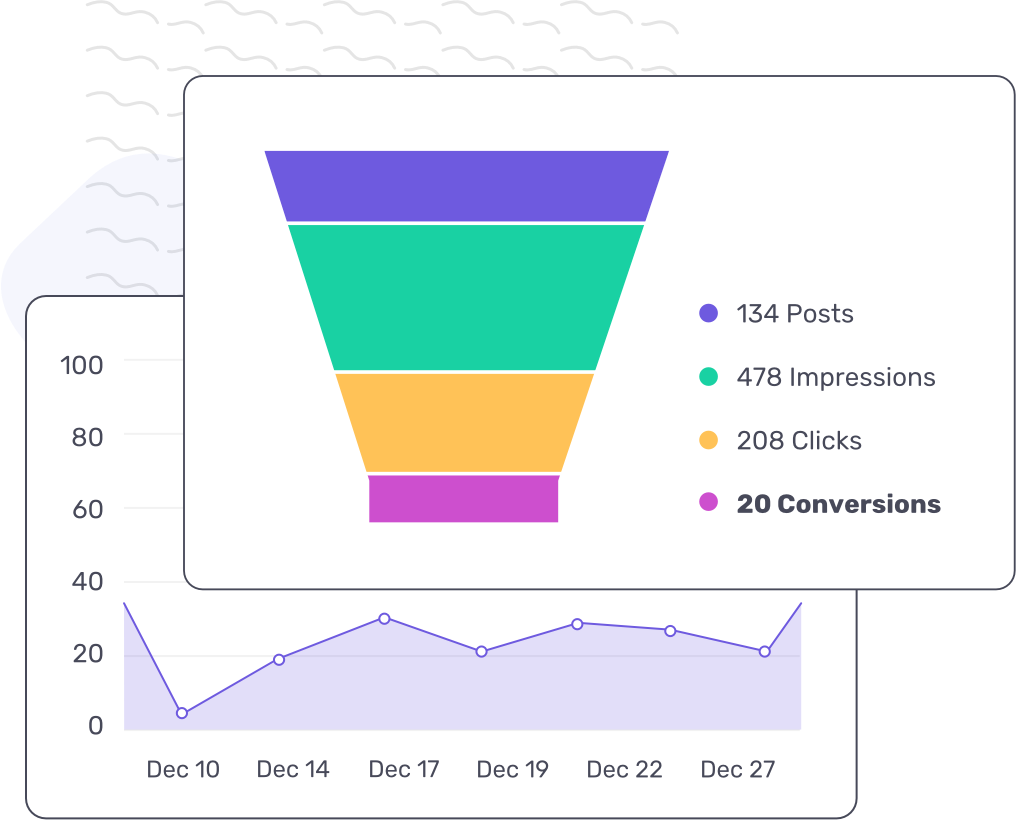
Oktopost’s social media solutions are GetApp favorites for a number of years. The tool excels in tracking lead generation over social networks, particularly in understanding the full lead journey and attributing leads to specific posts, campaigns, channels, or profiles. While tracking your KPIs, you can also assign a monetary value to your campaign activities to understand where the highest ROI is coming from.
Besides featuring widespread integration to the majority of CRMs and integrations, Oktopost recently released its own set of data analysis tools dubbed Social BI. They include all the necessary features to not only track and monitor your social media campaigns but also glean data-focused insights for your brand as well.
Pricing for Oktopost plans is custom and upon request.
2. SHIELD
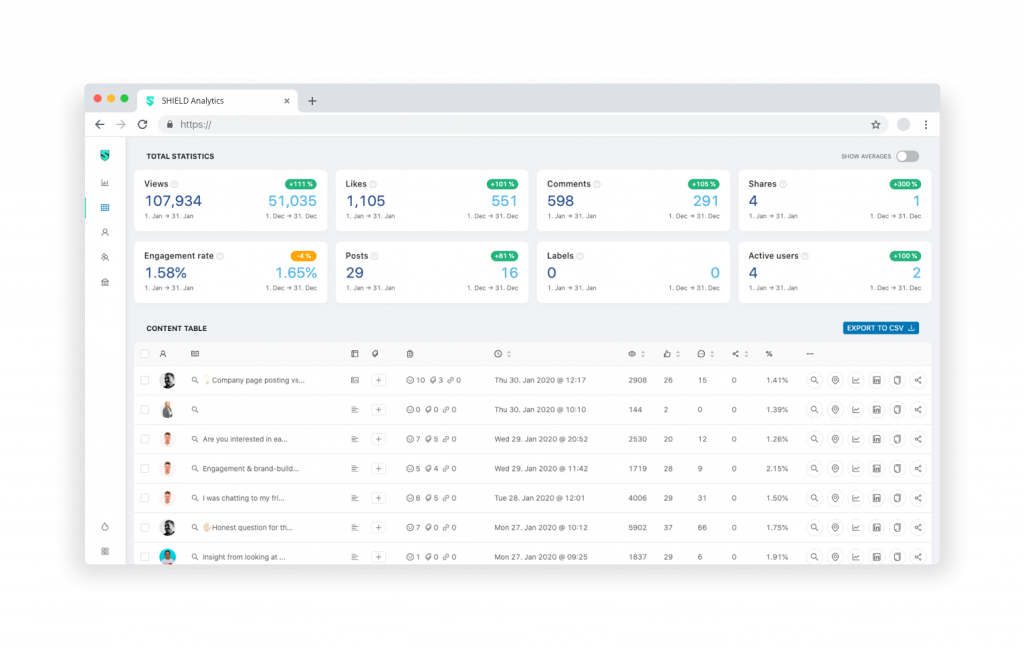
Shieldapp is the go-to solution for any digital marketer who counts LinkedIn as their primary social platform. The tool allows the tracking of and aggregated metrics for unlimited LinkedIn accounts. This is fortunate since LinkedIn accounts for 80% of B2B social leads overall. Shield features a highly-customizable dashboard that can track the presence of each team member separately, including their social growth and engagement changes over time.
Shield also provides AI automation of data collection and report creation and even dynamic dashboards. This leaves the quality of your reports and data consistent and frees up team members to focus on other data analytics aspects.
Pricing on Shield begins at $12 per month, and each plan includes a 10-day free trial.
3. Keyhole

Keyhole is a one-stop-shop for hashtag analytics across Twitter, Instagram, and Facebook. A market leader in hashtag tracking, it can follow your tags in real-time and share results with your clients with a wide variety of professional-quality, client-ready PDF reports. Keyhole also allows for calculating campaign ROI with high-quality, reliable data with verification provided by the company’s verification and guarantee.
In addition to hashtags, Keyhole can conduct an in-depth analysis of social sentiment over time for your various posts. It can also discover influencers within your industry and analyze their posting history to make sure you send them the right product or service.
Pricing for Keyhole starts at $49 per month per tool or $59 for both. The Keyhole Suite includes a 7-day free trial.
Customer data analysis
4. Exponea
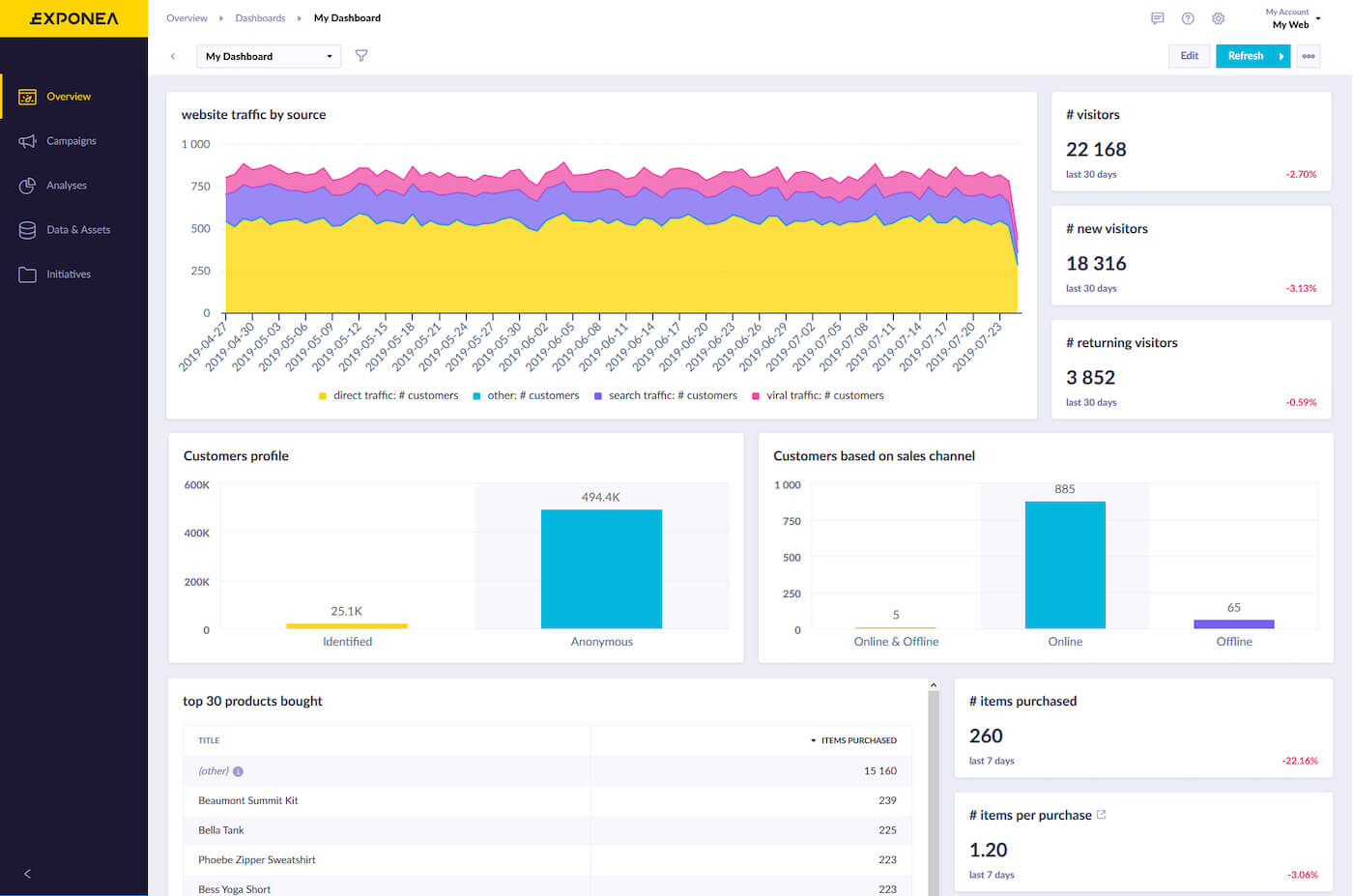
Exponea is a data analytics suite that specializes in AI-driven personalization and real-time updates. Exponea aims to be a one-stop-shop for your customer journey from acquisition through to retention. Single Customer View allows the user to launch highly-specialized and distinct campaigns optimized automatically for each customer. This is done using machine learning algorithms to examine the customer’s past and current, and predicted actions, and is easily scalable across your various touchpoints.
Pricing for Exponea is upon request for all of its available packages.
5. GoodData
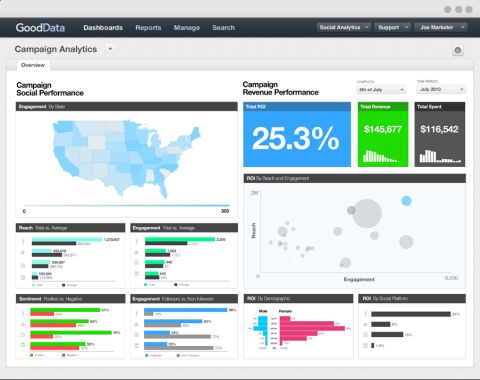
GoodData is a data analytics tool that by their account “doesn’t require a PhD to use” The analytics suite is excellent for sharing results with subsidiaries within your network, offering more transparent and streamlined decision making. You can also allow customers to publish their own reports and dashboards. This is done through embedded analytics within your products and services to retrieve deeper customer insights. It also has 4 data centers that allow for the free movement of data to any of the centers at any time.
Pricing for GoodData begins at $20 for the paid plans with a 30-day free trial included, with an option for a free plan.
6. Tableau
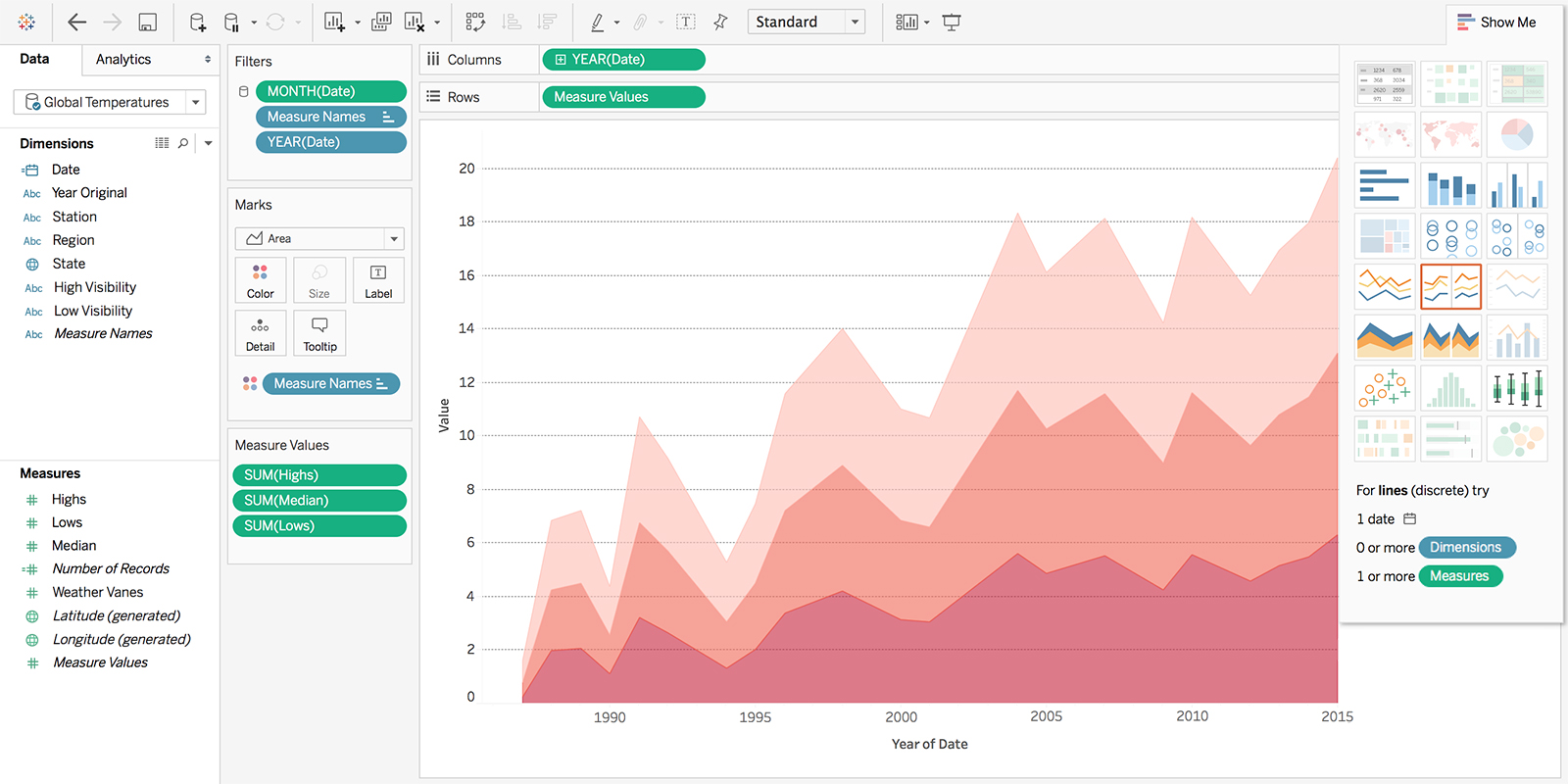
Tableau is an outstanding analytics tool that allows businesses to seamlessly connect, create visualizations of, and share their data. It features easy to use drag and drop features, allowing for even the more tech-illiterate in-depth access to big data analytics. The company’s recent acquisition by Salesforce has allowed for collaboration across the two platforms to uncover deeper insights, allow for smarter decision making, and offer a more intuitive and personalized customer experience.
Pricing for Tableau starts at $12 per user per month, and the online version begins at $15 monthly per user.
Campaign & web analytics
7. Sisense

Sisense’s self-titled “badass” technology was the first on the data analytics scene to offer a single-stack solution. The tool includes machine-learning-oriented anomaly detection, and the SiSense AI algorithm relies on high-performance deep learning networks to maximize accuracy. The tool is highly customizable, allowing you to create personalized dashboards for every team member.
Pricing is on request and changes according to the users’ needs.
8. Qlik

Branded a leader for the ninth year running amongst data analytics tools, Qlik stands alone as an all-in-one, end-to-end data management solution intended to transform your business from the bottom up. The Qlik Analytics Platform is capable of use embedded within IoT platforms, information services, an application, or as a simple mashup on its own. This allows users to share the value and visualizations you glean from analyzing your data with a much wider group of your suppliers and partners.
Qlik’s Associative engine is the focal point of the tool’s data analytics capabilities. It allows users to reuse previous models, visuals, and configurations with new projects and includes a large library of client-side APIs to assist in the visualization building process.
Pricing for Qlik Sense starts at $30, and a 30-day free trial is included.
9. Looker

Looker is one of the leading data analytics tools on the market. Acquired by Google in 2019, Looker excels at hinging data analytics with interactive data visualizations that make deep analysis simpler to manage.
Looker stands out with its exclusive LookML modeling language for data management. It expands standard SQL functionality to allow for model creation on the fly. To do so, the tool uses pre-constructed “Looker Blocks” that come feature-rich, including data models, SQL patterns, and onboard visualizations.
Pricing for Looker is upon request on a per case basis depending on the number of users and scale of deployment.
10. Contentsquare

Contentsquare is a swiss-army knife for digital analytics. From digital marketing to operations, merchandising to UX, the tool suite provides data-driven insights to departments across your brand. The data analytics shines when it comes to capturing and analyzing every in-page interaction and micro-gesture and gives you, the user, a reason why.
The easy-to-use suite also offers a “CS Live” Chrome Extension that is an invaluable solution for company stakeholders and team members alike to find quick answers to their questions without leaving the workspace. Additionally, Contentsquare offers AI-assisted alerts for spikes on certain KPIs that are more relevant to your brand and content.
Pricing for Contentsquare is upon request and custom to the number of monthly page views or sessions.
Big data analytics is no longer the future – it’s the present
Big data analytics have become increasingly adopted and utilized in businesses across departments and job titles. From enhancing market research and pricing to optimizing personalized buyer journeys, AI, and big data are critical pieces for any successful B2B marketing strategy.
Data analytics solutions are the most direct way to make sure every marketing dollar brings the greatest return on marketing investment possible. Knowing the major criteria for choosing which solution is right for your business needs is a first step towards making your disjointed data work for you. Our list is certainly not complete, so feel free to add your favorites in the comments!
from Oktopost https://ift.tt/32yWROM
via IFTTT
Comments
Post a Comment